What is a Subject Complement?
A subject complement is a word or group of words that follows a linking verb (such as "is," "am," "are," "was," "were," "seem," "appear," "become," "feel," etc.) and provides more information about the subject of the sentence. The subject complement can be a noun, pronoun, adjective, or an adverb.
Types of Subject Complements:
- Predicate Noun: A noun that renames or identifies the subject of the sentence. Example: She is a doctor.
- Predicate Adjective: An adjective that describes the subject of the sentence. Example: The cake looks delicious.
- Predicate Pronoun: A pronoun that renames or identifies the subject of the sentence. Example: He seems tired.
- Predicate Adverb: An adverb that modifies the subject of the sentence. Example: She appears happy.
Study Guide:
When identifying a subject complement in a sentence, follow these steps:
- Identify the subject of the sentence.
- Look for a linking verb in the sentence (e.g., is, am, are, was, were, seem, appear, become, feel, etc.).
- Find the word or group of words that follows the linking verb and provides more information about the subject. This word or group of words is the subject complement.
Remember that not all verbs are linking verbs, so it's important to distinguish between action verbs and linking verbs when identifying subject complements.
Practice identifying subject complements in sentences to reinforce your understanding of this concept.
.◂English Language Arts Worksheets and Study Guides Second Grade. Proper Nouns
Study Guide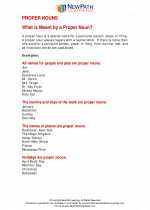 Proper Nouns
Proper Nouns  Activity Lesson
Activity Lesson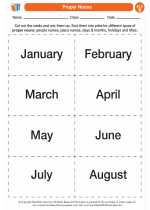 Proper Nouns
Proper Nouns  Worksheet/Answer key
Worksheet/Answer key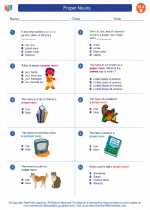 Proper Nouns
Proper Nouns  Worksheet/Answer key
Worksheet/Answer key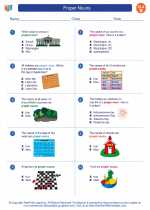 Proper Nouns
Proper Nouns  Worksheet/Answer key
Worksheet/Answer key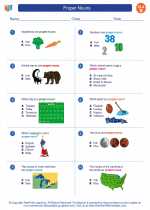 Proper Nouns
Proper Nouns  Worksheet/Answer key
Worksheet/Answer key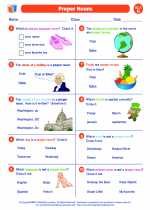 Proper Nouns
Proper Nouns  Worksheet/Answer key
Worksheet/Answer key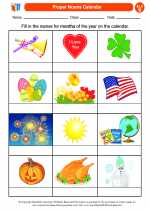 Proper Nouns Calendar
Proper Nouns Calendar  Worksheet/Answer key
Worksheet/Answer key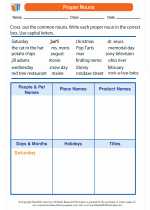 Proper Nouns
Proper Nouns  Worksheet/Answer key
Worksheet/Answer key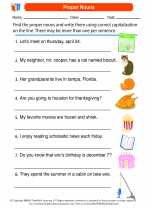 Proper Nouns
Proper Nouns 

 Activity Lesson
Activity Lesson
 Worksheet/Answer key
Worksheet/Answer key
 Worksheet/Answer key
Worksheet/Answer key
 Worksheet/Answer key
Worksheet/Answer key
 Worksheet/Answer key
Worksheet/Answer key
 Worksheet/Answer key
Worksheet/Answer key
 Worksheet/Answer key
Worksheet/Answer key
 Worksheet/Answer key
Worksheet/Answer key

The resources above cover the following skills:
Students employ a wide range of strategies as they write and use different writing process elements appropriately to communicate with different audiences for a variety of purposes. (NCTE)